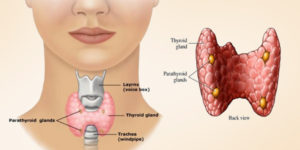Understanding Your Thyroid Gland

Our thyroid
Our 2” long butterfly shaped thyroid gland is located in the front of our necks, sort of low, right underneath an Adam’s apple location. It runs along the front of our windpipes & normally weighs less that an ounce. It has two side lobes (located on either side of your wind pipe) and its form looks to connect either side in a bridge like fashion. Its rich in blood vessels and as part of the endocrine system it secretes hormones… well when it works right! So, we will talk about Hashimoto’s disease, hypothyroidism today.
These hormones control:
- body temperature
- metabolic rate (the way your body uses energy)
- heart
- digestive function
- muscle control & strength
- bone maintenance
- memory issues
- menstrual cycles
- cholesterol levels
- and more!
Thyroid Hormones
One of the important hormones made by the thyroid (to be released into the blood stream in order to reach the body’s cells) is called Thyroxine or T4. On a chemical level that’s the amino acid L-tyrosine with 4 iodine atoms attached to it (hence its name T4). The thyroid gland uses iodine from the foods we ingest to make this hormone as well as Triiodothyronine or T3. These thyroid hormones are essential for the body.
T3 & T4 levels in the body must be in balance. They can’t be too high or too low. When everything is in good working order, our thyroid’s produces 80% T4 and 20% T3. T3 is considered to be the more active hormone because it functions at a cellular level. Once the thyroid releases T3 and T4 they travel through the bloodstream and circulate, helping cells to convert oxygen and calories consumed into energy for our metabolism. T3 and T4 regulate our heart rate and how fast our digestion works too. If these levels are too low our heart rates can be slower than normal, and or we can have trouble with digestion and elimination and my favorite problem: weight gain! If T3 and T4 levels are high, you may have symptoms such as a rapid heart rate, diarrhea & weight loss. (No, this is not the way to lose weight!)
Your body also needs thyroid hormones to make cholesterol and to get rid of the cholesterol it doesn’t need. When thyroid hormone levels are low (hypothyroidism), our bodies don’t effectively remove LDL cholesterol (low density lipoprotein commonly known as the “bad cholesterol”)! Bottom line is that nearly every cell in our body depends on thyroid hormones to control metabolic activity within the cell.
Do you remember that game we played as a kid?? “The foot bone is connected to the ankle bone, the ankle bone is connected to the shin bone, the shin bone is connected to the thigh bone…” etc. Well, the thyroid is a lot like that. This interdependent and woven dance is furthered by the hypothalamus and pituitary (glands in the brain) which communicate to maintain T3 & T4. The hypothalamus releases Thyrotropin Releasing Hormone (TRH) which tells the pituitary gland to release thyroid stimulating hormone (TSH).
The thyroid gland can become overactive as in hyperthyroidism or under active (hypothyroidism). While in rare cases this occurs from birth, it mostly develops later in life. Hyperthyroidism is often accompanied by an enlargement of the gland. This is called a goiter. Hypothyroidism is the term given when low levels of thyroid hormones are produced in the body. This can be a result of an autoimmune disease.
When a person’s immune system starts to attack its own body – you have an autoimmune issue. It is as if your body becomes allergic to its thyroid gland and forms antibodies against it. Autoantibodies, made by white blood cells called lymphocytes, appear in our blood and serve as markers for this condition. The end result is damage to thyroid tissue. When enough tissue has been destroyed, your thyroid hormone production falls below normal, and symptoms of hypothyroidism appear.
By now many of us are overwhelmed and wondering why it’s so complicated to manage this little butterfly shaped gland. After all, we just want to hit the switch & turn on the light. I’m there with you! So imagine how much more complicated it gets with autoimmune issues?!
So what do you do if you think you have a thyroid problem?
- Do an informal at home test: keep a basal thermometer by your bedside and take your temperature every morning BEFORE lifting your body to get out of bed. A temp of less than 97.5 may indicate a problem. Do this for at least three days. Do this any 3 days EXCEPT the first few days of your menstrual cycle. Calculate your average temperature. If it is consistently low, it suggests you may have a problem.
- Go to the doctor and request a COMPLETE THYROID PROFILE. I put this in all caps because it is common for Drs. to do only TSH. If your TSH only test comes back normal they have no desire/reason to further investigate your symptom issues.
- Go to an endocrinologist. If you are diagnosed with low thyroid function, find out what is causing it. Unless you are completely satisfied with the medicine and your symptoms are gone, dig deeper.
The very first time I went to a doctor with symptoms of being cold all the time, my hair falling out, the freight train feeling that went through my body, the digestive issues and weight gain they ran only TSH. It came back normal. They thought I was being silly, complaining about hair loss when my hair was so thick. I tried to explain how this was not normal for me… They shrugged it off as over reacting. See my post on ABOUT ME.
So sure that my thyroid was not my problem, the Dr. suggested an antidepressant. Within a week, I came back covered in hives & with more symptoms. The third time I appeared in the doctor’s office, the doctor suggested that I give the antidepressant more time to work, but his Nurse suggested I get a complete thyroid profile. We did.
When the results returned my doctor asked me how I was standing in front of him. I really wanted to respond that given the choice I wouldn’t be standing in front of him but rather kicking his derriere. I was young and did not know to stand firm and advocate for my health care needs or even what to push for. Admittedly, this was also before the internet was popular and every household had a PC. Thank God for that nurse.
After my thyroid symptoms did not get significantly better from the medicine (Synthroid at the time) I went to an endocrinologist and learned the cause of my hypothyroidism: Hashimoto’s disease. The resulting inflammation from Hashimoto’s disease (cause of hypothyroidism) is also known as chronic lymphocytic thyroiditis.
Hashimoto’s disease appears to be an inherited condition. Apparently, we need to inherit the gene or set of genes to be able to develop this disorder. However, just because you inherit this genetic tendency, doesn’t mean you will actually develop the disease itself. In my case I’m adopted, so family history was a mystery. Then again, sometimes, even if you aren’t adopted your family is still a mystery!
March 5, 20162 Comments
Comments are closed.



Did they relate your hunger to the thyroid issue?
Good question Cindy. No, At the time I weighed 118 lbs up from 112 lbs but I had had a baby 6 months earlier and gained 60 lbs so they didn’t factor changes in appetite or weight. They assumed that I couldn’t be HYPOthyroid since those people are generally struggling with weight issues. They are usually more senior in age then I was as well. I was in my mid 20’s at the time.